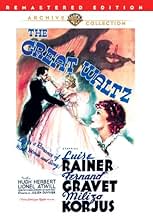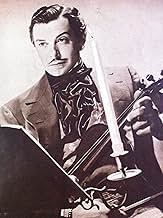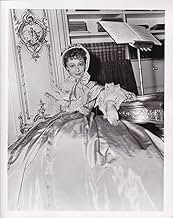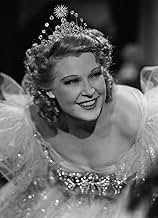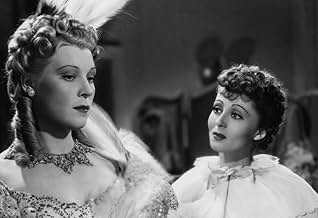IMDb RATING
6.4/10
1.4K
YOUR RATING
Johann Strauss II pursues his passion for waltzes in 1845 Vienna, facing societal resistance. His music gains popularity through opera singers, leading to fame and personal conflicts between... Read allJohann Strauss II pursues his passion for waltzes in 1845 Vienna, facing societal resistance. His music gains popularity through opera singers, leading to fame and personal conflicts between his wife and a passionate affair.Johann Strauss II pursues his passion for waltzes in 1845 Vienna, facing societal resistance. His music gains popularity through opera singers, leading to fame and personal conflicts between his wife and a passionate affair.
- Won 1 Oscar
- 2 wins & 3 nominations total
Fernand Gravey
- Johann Strauss
- (as Fernand Gravet)
Sig Ruman
- Wertheimer
- (as Sig Rumann)
Ernie Alexander
- Revolutionary
- (uncredited)
Featured reviews
10Esierra2
I own a VHS copy of The Great Waltz. I have seen this movie I don't know how many times! I was very young when I saw the movie for the first time, and it made a great impact on me and ever since then, I feel the urge to look and hear the magnificent singer and actress that, in my opinion takes the first place in this movie: MILIZA KORJUS. I have managed to collect ALL her recordings, I think., but I never saw the movie as a political issue or as they say here, as anti Nazi film! Nothing of the sort! To me it's a delightful movie and a great vehicle for the display of the many talents of Miliza Korjus and also for the rest of the cast and the romanticism involved in the whole movie.
A perfect and absolute delight from beginning to end. The great music of Johann Strauss is performed in such beautiful, elaborate settings! MGM reproduced Vienna and the era perfectly. It is too bad this was the only film in which Miliza Korjus appeared. Such a magnificent voice and charming personality! The carriage ride in the Vienna Woods and that final, unbelievable, note she holds for what seems like eternity are never to be forgotten. Luise Rainer is wonderful and could always convey such emotion without ever uttering a word. Perfect casting, with so many great character actors in supporting roles.
10guidon7
Perhaps the number one Hollywood musical film of all time. "Gorgeous Korjus" was coined and used by Louis B. Mayer to promote her film career, which understandably would be short. Not only is she gorgeous in GW but turns in an excellent acting performance which drew an academy award nomination. Her acting role rivals or exceeds consummate actress and two-time academy award winner, Luise Reiner. Displaying the temperament of a real primadonna, Miss Korjus turns on her good and bad sides when you least expect it. Vocal waltzes are extremely difficult to sing and Korjus with her coloratura soprano does admirably. Frenchman Fernand Gravet is believable as Strauss (as far as the film is believable) and ably supported by the likes of Lionel Atwill and Hugh Herbert along with many others, few of whom have a Teutonic accent, but we still have a romantic view of old Vienna. It is not a factual biography, which is stated at the beginning of the film, but there are elements of truth in the composite of Strauss the Elder and Strauss the younger as performed by Gravet (Strauss the Younger was a womanizer and while married actually had a liaison with an opera singer, among others). The Vienna Woods segment is pure joy. Strauss playing Tales from the Vienna Woods on his violin and Carla Donner singing in accompaniment's, their whirling dancing, ending up on the ground, where Strauss goes no further and wistfully admits "Carla, I'm married." The audience, I think, expects a tantrum from Donner at this revelation, but she gracefully takes it in stride and fools us once again with her unpredictability! This scene, to me, was the high point of an exceptional film of the type we shall never see again.
I was prepared to find that Julien Duvivier, maestro of such astonishing French pictures as 'Pépé le Moko' and 'Carnet de bal', had sold out completely to Hollywood, but actually 'The Great Waltz' blew me away.
Yes, the story is utter hokum and bears only superficial similarity to the actual Johann Strauss II or the the Vienna of his time. Why is that a surprise to some? It's a given! Hollywood was always like that, now as ever. What Duvivier does manage to convey is the dream of Vienna, the illusory magic of the city that was the capital of musical Europe, and thereby of the world.
Duvivier made this amazing film with attention to every detail, the smallest character performance, even the extras have obviously been minutely directed. The film is always stylistically innovative, the editing fast-paced and often surprising, the style whirling, ecstatic, dynamic, and at all times slightly camp. There are so many show-stopping scenes in the film that I wouldn't even know where to start listing them. The script is wonderful, the dialogue consistently funny, interiors are luminous, the cinematography revolutionary and clearly related to what Rouben Mamoulian was doing in Hollywood in the early 1930's.
The actors? Absolutely great. Fernand Gravey does a fair job, but the two women shine above everything else. Polish coloratura soprano Miliza Korjus sings the Strauss songs in a way that admittedly sound rather corny and old-fashioned today, but as an actress, playing the opera diva that Strauss is two-timing his wife with, she is gorgeously wicked, one of the most glamourous beings even in the Hollywood of the 30's. But even she is overshadowed - by Luise Rainer who, in this picture, can do no wrong in a part that is very, very hard to make substantial. She is Strauss' long-suffering, unselfish wife, but there is absolutely no melodrama in her performance. The evolution of the chararacter that is Poldi Strauss is extremely well-calculated, and she remains the centre, the gravity of the picture. And when we think that now she has suffered long enough, she says, "Now is not a time to lie down, now is time to act!".
Forget all petty reservations and brace yourselves for a real treat, a film that time has all but forgotten, but a masterpiece none the less.
Yes, the story is utter hokum and bears only superficial similarity to the actual Johann Strauss II or the the Vienna of his time. Why is that a surprise to some? It's a given! Hollywood was always like that, now as ever. What Duvivier does manage to convey is the dream of Vienna, the illusory magic of the city that was the capital of musical Europe, and thereby of the world.
Duvivier made this amazing film with attention to every detail, the smallest character performance, even the extras have obviously been minutely directed. The film is always stylistically innovative, the editing fast-paced and often surprising, the style whirling, ecstatic, dynamic, and at all times slightly camp. There are so many show-stopping scenes in the film that I wouldn't even know where to start listing them. The script is wonderful, the dialogue consistently funny, interiors are luminous, the cinematography revolutionary and clearly related to what Rouben Mamoulian was doing in Hollywood in the early 1930's.
The actors? Absolutely great. Fernand Gravey does a fair job, but the two women shine above everything else. Polish coloratura soprano Miliza Korjus sings the Strauss songs in a way that admittedly sound rather corny and old-fashioned today, but as an actress, playing the opera diva that Strauss is two-timing his wife with, she is gorgeously wicked, one of the most glamourous beings even in the Hollywood of the 30's. But even she is overshadowed - by Luise Rainer who, in this picture, can do no wrong in a part that is very, very hard to make substantial. She is Strauss' long-suffering, unselfish wife, but there is absolutely no melodrama in her performance. The evolution of the chararacter that is Poldi Strauss is extremely well-calculated, and she remains the centre, the gravity of the picture. And when we think that now she has suffered long enough, she says, "Now is not a time to lie down, now is time to act!".
Forget all petty reservations and brace yourselves for a real treat, a film that time has all but forgotten, but a masterpiece none the less.
This fictional account of Johann Strauss' life is highlighted by one of the most exquisite scenes in musical history--far from real of course--in which the composer and an operatic diva are driven through the woods in horse and buggy while the countryside comes alive with the sound of music. The pastoral beauty of the scene itself combined with the intricate way 'Tale of the Vienna Woods' is woven into the musical scene (as composer Strauss begins humming the tune along with his diva friend) is just one of the charming highlights of this MGM musical.
Swirling waltzes are captured with such superb angles in the Oscar-winning camerawork, it's no wonder David O. Selznick was impressed enough to insist that his own technical staff derive inspiration from viewing the film.
Soprano Miliza Korjus does some excellent trills as the operatic diva who steals Strauss from his wife (temporarily) until the obligatory happy ending. Luise Rainer suffers gracefully (in an insufferable role as the wife!!) and Fernand Gravet does well as the composer. His scenes with Miliza Korjus are what makes the film the gem that it is. She all but steals the film and was nominated for a Supporting Actress Oscar and then disappeared from the American scene, returning to Europe to resume her operatic career.
Swirling waltzes are captured with such superb angles in the Oscar-winning camerawork, it's no wonder David O. Selznick was impressed enough to insist that his own technical staff derive inspiration from viewing the film.
Soprano Miliza Korjus does some excellent trills as the operatic diva who steals Strauss from his wife (temporarily) until the obligatory happy ending. Luise Rainer suffers gracefully (in an insufferable role as the wife!!) and Fernand Gravet does well as the composer. His scenes with Miliza Korjus are what makes the film the gem that it is. She all but steals the film and was nominated for a Supporting Actress Oscar and then disappeared from the American scene, returning to Europe to resume her operatic career.
Did you know
- TriviaToscha Seidel, the Russian virtuoso violinist, was hired especially to dub the solos on the soundtrack for Johann Strauss (Fernand Gravey) and began a new career working as a concert master at MGM and other studios.
- Quotes
Johann 'Schani' Strauss II: Thanks for firing me, Mr. Wertheimer. Goodbye, you worms!
- ConnectionsFeatured in Another Romance of Celluloid (1938)
- SoundtracksTales From the Vienna Woods, Op.325
(1868) (uncredited)
Music by Johann Strauss
Lyrics by Oscar Hammerstein II
Hummed by Fernand Gravey as it is being composed
Sung by Miliza Korjus
Played as background music often
- How long is The Great Waltz?Powered by Alexa
Details
- Runtime
- 1h 44m(104 min)
- Color
- Aspect ratio
- 1.37 : 1
Contribute to this page
Suggest an edit or add missing content


